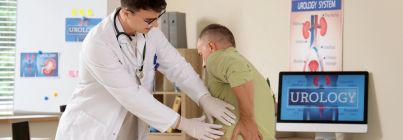UC Davis Pediatric Urology Expert Awarded Stem Cell Grant
Research to pave the way for bioengineered tissue and organs
April 30, 2010
Eric Kurzrock, professor of urologic surgery and pediatrics at UC Davis, has received an $885,000 grant from the California Institute for Regenerative Medicine (CIRM) for stem cell research that aims to lead the way to bioengineering replacement organs such as bladders.
Kurzrock’s award, among the 16 grants approved by the agency’s governing board at its April 29 meeting, will support basic research to answer fundamental questions about stem cell biology. The funding will enable him to explore ways to direct human stem cells into becoming the unique cells that line the bladder. The technique could make it possible for surgeons to bioengineer new tissue for treating patients with bladder defects or bladder cancer.
Adults with bladder cancer and children with spina bifida frequently require bladder reconstruction. Current surgical techniques, which use parts of the intestine as a substitute for the bladder wall, can lead to further complications for patients, including cancer. Being able to engineer stem cells into becoming urothelial cells – the cells that line the inner layer of the urinary tract – is a major goal in regenerative medicine, with important clinical implications.
Jan Nolta, director of the UC Davis Institute for Regenerative Cures and co-principal investigator on the award, noted that the grant is an important step forward in helping children born with spina bifida and other types of bladder disorders.
“The current clinical practices of using bowel sections to engineer the bladder do need room for improvement,” said Nolta. “Our dream is to grow new bladder tissues in the laboratory for these children and others who need them. Eric Kurzrock is at the forefront of this research and it is exciting that CIRM-funded stem cell projects now include research that could help address spina bifida and other conditions that involve bladder disorders.”
Kurzrock, who is the Sacramento region’s only pediatric urology surgeon, will investigate both the mechanisms and biological markers involved in cellular development, as his research team induces human embryonic stem cells into becoming a more specialized cell type, urothelium. It will give scientists a better understanding about normal and abnormal differentiation, helping clinicians calculate the malignancy of bladder cancers and enabling them to develop better treatments.
“If we can decipher the mechanisms needed to effectively guide stem cells into becoming urothelial cells,” said Kurzrock, “we will not only gain the potential of being able to regenerate a human organ such as the bladder, but we also will obtain crucial insights into the causes of bladder cancer.” Bladder cancer is the fourth most common cancer in the United States, responsible for 15,000 deaths in 2008. Due to its high rate of recurrence, it also is the most expensive of all cancers to treat.
This week’s grants from CIRM are designed to advance understanding of fundamental questions in stem cell biology and to foster the discovery of innovative approaches to the differentiation of stem cells, so they ultimately can be used as new stem cell therapies to treat patients.
UC Davis is playing a leading role in regenerative medicine, with nearly 150 scientists working on a variety of stem cell-related research projects at campus locations in both Davis and Sacramento. The new UC Davis Institute for Regenerative Cures, a facility supported by the California Institute for Regenerative Medicine (CIRM), recently opened its doors on the university's Sacramento campus. This $62 million facility is the university's hub for stem cell science. It includes Northern California's largest academic Good Manufacturing Practice laboratory, with state-of-the-art equipment and manufacturing rooms for cellular and gene therapies. UC Davis also has a Translational Human Embryonic Stem Cell Shared Research Facility in Davis and has a collaborative partnership with the Institute for Pediatric Regenerative Medicine at Shriners Hospital for Children Northern California. All of the programs and facilities complement the university's Clinical and Translational Science Center, and all focus on turning stem cells into cures. For more information, visit https://health.ucdavis.edu/urology/research/research_kurzrockgrant.html.

